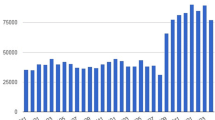Abstract
We identified a lack of continuity in student-generated learning aids and the sharing of advice and resources between medical graduating classes. Carverpedia, built in the UIowa Wiki platform, is a novel collaboration between pre-clinical medical students and faculty to produce a centralized location for learning aids at the Carver College of Medicine. Carverpedia is designed to organize files and links in a centralized location accessible to all students. Previously, items were shared through various modalities (e.g., Facebook, email, etc.) without equal access for every student or well-developed archiving. After one academic year of use, there were 217 resources posted to the wiki site by 34 authors. Content posted on Carverpedia differed from Facebook content, with increased content summaries and active-learning. Site utilization, collected by Google Analytics, found 2979 sessions on Carverpedia and a total of 10,253 page views. Site usage and posting of resources was highly correlated with basic science exam schedule. This corresponded with the students surveyed on site usage, with the majority of students using Carverpedia for basic science courses, like Gross Anatomy and Foundations of Cellular Life. Of note, surveyed students found faculty-authored content, practice questions, content summaries, and active-learning resources the most useful of the resources posted. Overall, we found the Wiki format is effective as a means of creating an online community of support and collaboration for student-authored and faculty-authored learning resources.



Similar content being viewed by others
References
Fosnot CT. Constructivism: theory, perspectives and practice. New York, NY: Teachers College Press; 1996.
Wertsch JV. Vygotsky and the social formation of mind. Cambridge, MA: Harvard University Press; 1985.
Dewey J. Logic, the theory of inquiry. New York, NY: H. Holt and Company; 1938.
Matthews MR. Introductory comments on philosophy and constructivism in science education. Sci Educ-Netherlands. 1997;6:5–14. doi:10.1023/A:1008650823980.
Dennick R. Constructivism: reflections on twenty five years teaching the constructivist approach in medical education. International Journal of Medical Education. 2016;7:200–5. doi:10.5116/ijme.5763.de11.
Ainsworth S, Prain V, Tytler R. Drawing to learn in science. Science. 2011;333:1096–7. doi:10.1126/science.1204153.
Chi MTH, Bassok M, Lewis MW, Reimann P, Glaser R. Self-explanations: how students study and use examples in learning to solve problems. Cognitive Sci. 1989;13:145–82. doi:10.1207/s15516709cog1302_1.
Ainsworth S, Loizou AT. The effects of self-explaining when learning with text or diagrams. Cognitive Sci. 2003;27:669–81. doi:10.1016/S0364-0213(03)00033-8.
Schwartz DL. The emergence of abstract representations in dyad problem solving. J Learn Sci. 1995;4:321–54. doi:10.1207/s15327809jls0403_3.
Dweck CS. Self-theories: their role in motivation, personality and development. Florence, KY: Psychology Press; 1999.
Slavich GM, Zimbardo PG. Transformational teaching: theoretical underpinnings, basic principles and core methods. Educ Psychol Rev. 2012;24:569–608. doi:10.1007/s10648-012-9199-6.
Ali A. Medical students’ use of Facebook for educational purposes. Perspect Med Educ. 2016;5:163–9. doi:10.107/s40037-016-0273-5.
Black EW. Wikipedia and academic peer review. Online Inform Rev. 2008;32:73–88. doi:10.1108/14684520810865994.
Rector LH. Comparison of Wikipedia and other encyclopedias for accuracy, breadth and depth in historical articles. Ref Serv Rev. 2008;36:7–22. doi:10.1108/00907320810851998.
Callahan E, Herring SC. Cultural bias in Wikipedia content on famous persons. J Am Soc Inf Sci Tec. 2011;62:1899–915. doi:10.1002/asi.21577.
Giles J. Internet encyclopedias go head to head. Nature. 2005;438:900–1. doi:10.1038/438900a.
Chesney T. An empirical examination of Wikipedia’s credibility. First Monday. 2006;11
Thompson CL, Schulz WL, Adam T. A student authored online medical education textbook: editing patterns and content evaluation of a medical student wiki. AMIA Annu Symp Proc. 2011;2011:1392–401. PMID: 22195202
Selwyn N. Faceworking: exploring students’ education-related use of Facebook. Learning, Media and Technology. 2009;34:157–74. doi:10.1080/17439880902923622.
Cain J. Using Facebook as an informal learning environment. Am J Pharm Educ. 2011;75. doi:10.5688/ajpe7510207.Article 207
Acknowledgements
The authors wish to acknowledge The University of Iowa Office of Teaching, Learning and Technology for their expert assistance in building the Carverpedia website and managing enrollments throughout the year. This project was funded by The University of Iowa Roy J. and Lucille A. Carver College of Medicine Office of Student Affairs and Curriculum.
Author information
Authors and Affiliations
Corresponding author
Ethics declarations
All procedures performed in studies involving human participants were in accordance with the ethical standards of the institutional review committee and with the 1964 Helsinki Declaration and its later amendments or comparable ethical standards. No identifiable personal data were gathered from participants in this study. This study has been approved by The University of Iowa Institutional Review Board for human subjects research (2014, IRB no. 201403757). The authors have no conflicts of interest to disclose.
Additional information
Nicholas Borcherding, Matthew Rudolph and Amy Tierney contributed equally to this article
Rights and permissions
About this article
Cite this article
Borcherding, N., Rudolph, M., Tierney, A. et al. Content Evaluation, Usage Profile, and Student Preferences Related to a Medical Student Wiki for Student-Authored Learning Resources (Carverpedia). Med.Sci.Educ. 27, 41–50 (2017). https://doi.org/10.1007/s40670-016-0358-0
Published:
Issue Date:
DOI: https://doi.org/10.1007/s40670-016-0358-0




